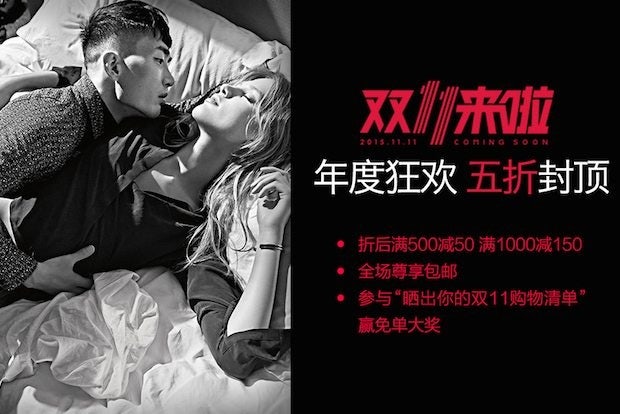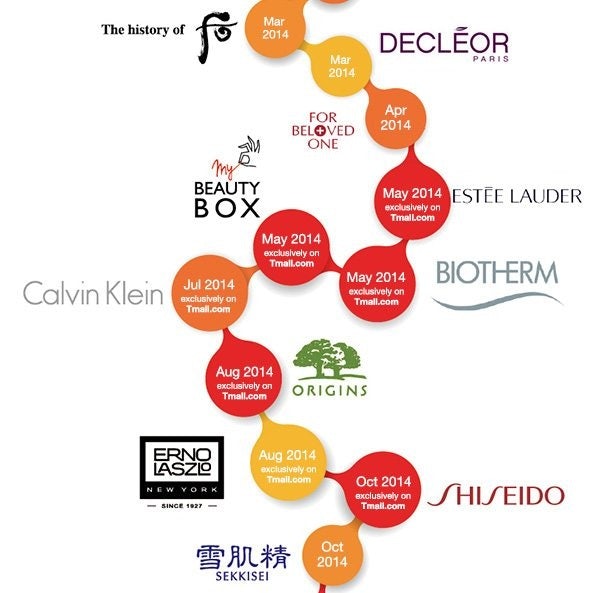
Known for steep discounts on everything from electronics to food, upcoming Chinese online shopping bonanza Singles’ Day is becoming increasingly popular for consumers hunting for deals on premium and even luxury brands.
Held every year on November 11, the Alibaba-invented online shopping holiday generated more than $9 billion in sales last year. This year, spending is expected to increase by 22 percent to 1,760 RMB (US$276) per shopper, according to Nielsen. Online shoppers will be able to choose from around 6 million products this year being sold by 40,000 merchants and 30,000 brands. And although the day is most known for bargain-basement discounts on mass-market items, e-commerce platforms’ push toward including more premium brands means that Singles’ Day is offering an increasingly diverse selection of high-end goods.
Although many luxury brands remain wary of diluting their upscale image by associating with Tmall’s mass-market, discount-driven identity, premium international clothing brands on Tmall including Calvin Klein, Ports, Hugo Boss, and Lacoste are all advertising Singles’ Day promotions. Burberry, which also has a Tmall store, has participated in the past but does not seem to be advertising discounts this year.
Chinese consumers are increasingly willing to purchase luxury online. A recent survey by market research firm KPMG found that the average maximum amount Chinese consumers are willing to pay online for a single item skyrocketed from 1,900 RMB (US$298) in 2014 to 4,200 RMB (US$660) this year. According the results of a survey by research firm YouGov, 44 percent of Chinese consumers planning to shop for Singles’ Day have set a budget of 1,000 (US$157) to 7,000 RMB (US$1,100), while 7 percent plan to spend 7,000 RMB or more. Singles’ Day will prove especially lucrative for premium and luxury fashion brands, as YouGov found that “apparel, accessories, shoes, and bags” is the most popular category that Chinese consumers are planning to buy, with 64 percent listing the category.
Online-to-offline (O2O) deals are a significant highlight of this year’s event as Alibaba says it’s working with over 180,000 offline retailers. Estée Lauder is one of the brands getting in on the O2O sales by offering free or discounted services at its department store counters for anyone who orders from the brand’s Tmall shop on Singles’ Day.
But even as O2O becomes increasingly important, Singles’ Day shopping is mainly being shaped by the mobile shopping revolution that has overcome China’s e-commerce market. According to YouGov, 61 percent of Singles’ Day shoppers plan to use their smartphones to buy goods, while only 46 percent will use laptops.
Unlike clothing labels, premium cosmetics brands have flocked to online shopping platforms like Tmall, and are enthusiastic about taking part in Singles’ Day promotions. In addition to Estée Lauder, brands including Lancôme, L’Occitane, Shiseido, Clinique, and Clarins are all offering Singles’ Day deals on Tmall. According to YouGov’s survey, 32 percent of Singles’ Day shoppers plan to purchase cosmetics over the holiday.

It’s not just premium brands on Alibaba sites getting in on Singles’ Day promotions as luxury e-commerce stores across the web offer special deals. Flash sales site Mei.com is offering a special “Independent Women” promotion in a nod toward the holiday’s “Valentine’s Day for singles” origins, offering discounts for those who spend 1,000 RMB or more, as well as a special promotion for Michael Kors items. Traditional non-discount luxury e-boutiques are offering deals as well. Yoox’s China site is offering a special checkout discount code, Xiu.com is offering five different promotions, including discounts for those who spend 800 RMB (US$125) or more, and ShangPin is discounting a wide range of luxury items such as Prada bags, Ferragamo flats, and Kenzo sweatshirts for the holiday.
Alibaba competitor JD.com is also actively participating in the holiday as it launches a massive PR battle against Alibaba. On JD.com’s platform, Sephora is offering special discounts and free gifts for those who spend a certain amount, as well as a free Apple Watch to its biggest spender. JD.com is turning up the heat on Alibaba, and filed a lawsuit against last week just in time for Singles’ Day, accusing it of false advertising and unfair competition by exaggerating promises of same-day delivery capabilities and allegedly forcing retailers to offer Singles’ Day promotions exclusively on Tmall.
Whether shoppers opt to head to Tmall, JD.com, or smaller e-tailers for the upcoming shopping season, experts believe they’ll be spending big. According Jessica Qian, a partner in charge of consumer markets at KPMG, “We expect that China Singles’ Day spend this year will be bigger than ever, illustrating the buying power of the Chinese consumer and the increasing prominence of the date in the Chinese retail calendar.”